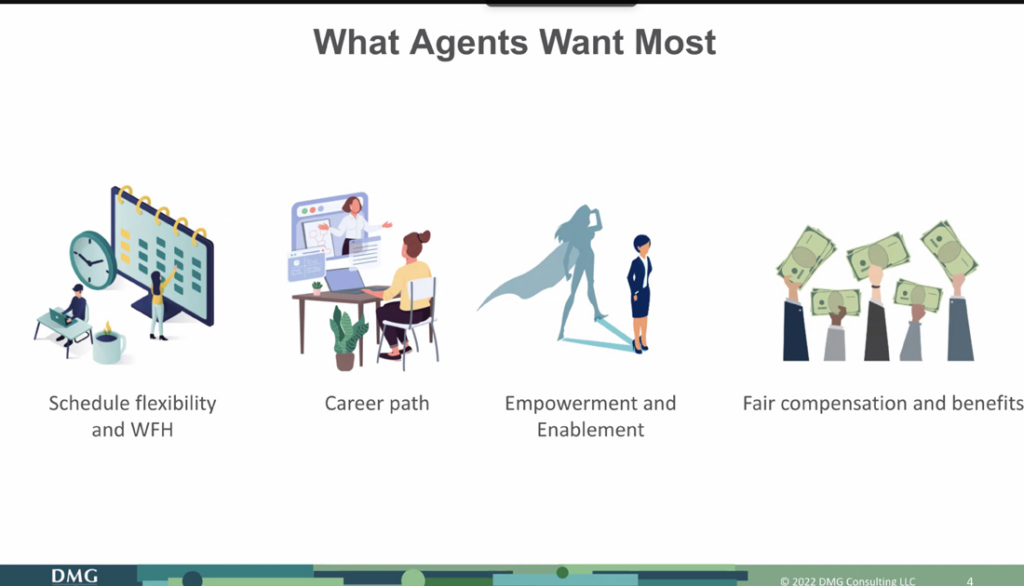Agent retention has been a major headache for IT leaders since the dawn of time – or at least the creation of call centers – and the COVID pandemic exacerbated the problem. A 2021 report by the Quality Assurance and Training Connection found that annual turnover in the call center industry averages 30 to 45 percent, and can hit triple digits in some organizations. In general, turnover is much higher in routine, order-taking or outbound telemarketing positions, and lower in more specialized and higher-level jobs.
But there are a number of positive strategies that contact center managers can implement to reduce costly turnover, according to Donna Fluss, president, DMG Consulting, in a recent webinar, “Reversing the Great Resignation: Strategies for Improving Agent Retention,” sponsored by ujet.com. “During the pandemic, contact center leaders did a magnificent job of getting agents to represent their organizations from home,” Fluss said. “Now, a lot of are people at all levels are thinking about what life means to them. In that regard, the great resignation has actually been a positive thing for contact centers because it has elevated the turnover problem to the attention of senior executives looking at the entire organization.”
Become an employer of choice
Perhaps the most important step in reducing turnover is to become an employer of choice. “We need to reframe the idea of the contact center being a transient place, listen to agents and give them what they want most,” said Fluss. She noted that top agent priorities include:
- Schedule flexibility during the day and week
- A career path with options
• Empowerment and enablement with daily tasks
- Fair compensation and benefits
“Your people have to be aligned with your technology and processes,” she added. “After all, they are front-line workers dealing the public, and it’s not easy to deliver an outstanding customer experience.”
Contact center leaders can also strive to connect the agents’ work to the organization’s mission. Helping them see the “big picture” can motivate them to stay engaged and productive, reducing any personal feelings of discouragement.

More tips for retention
Here are other tips for boosting agent retention.
• Focus on CX outcomes. If you are still measuring agent success based solely on productivity, it’s time to rethink your priorities, said Fluss. Look at your KPIs (key performance indicators) and think about changing metrics that focus on how fast calls are resolved or the volume of calls an agent handles.
• Update your workforce management (WFM) application. Today’s WFM solutions offer greater scheduling flexibility, empowering agents by giving them more control of their time. For instance, work-from-home agents could select non-con security work increments, allowing them to take care of errands or family matters during the day.
• Review your policies and procedures. If they date back to pre-pandemic times, you could put together a task force, including agents, so they are aligned with the current mindsets of agents and customers, said Fluss.
• Consider boosting agent compensation. While managing costs is always a contact center concern, the role of agents has been elevated in the past three years. “Much of the easy stuff has now been automated,” Fluss said. “So, look at your agents as brand advocates and ambassadors – and pay them accordingly.” For instance, you could use salary arbitrage to incentivize agents to take graveyard and weekend shifts.
• Offer coaching, training and career advancement programs. Agents who enjoy helping customers should be able to make a good living in that role,” Fluss said. “Of course there are many other career paths, such as a reporting analyst, speech or text administrator, or artificial intelligence specialist to name a few examples.”
• Establish “stay interviews.” Talk with your agents about their job satisfaction, personal goals and obstacles they are facing, Fluss said. Then, you can intervene, if necessary, to address those issues before they leave.
Finally, Fluss emphasized the importance of hiring strong managers with the “people touch” and giving them the tools and resources to support their agents. “Loss of trust in the immediate manager is one of the reasons agents leave the contact center,” she said. “Be sure you hire and retain managers who their agent’s best interests at heart.”